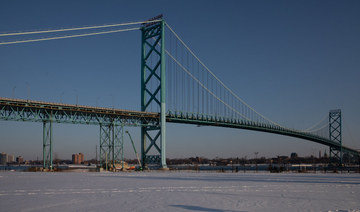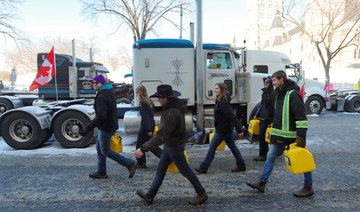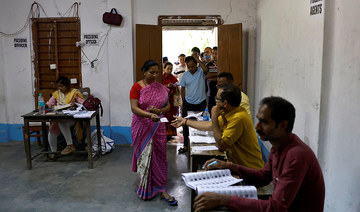WINDSOR, Ontario: A judge on Friday ordered protesters at the Ambassador Bridge over the US-Canadian border to end the 5-day-old blockade that has disrupted the flow of goods between the two countries and forced the auto industry on both sides to roll back production.
It was not immediately clear when or if law enforcement officers would be sent in to remove the demonstrators, who parked their pickups and other vehicles in a bumper-to-bumper protest against the country’s COVID-19 restrictions and an outpouring of fury toward Prime Minister Justin Trudeau and his Liberal government.
Chief Justice Geoffrey Morawetz of the Ontario Superior Court said during a virtual hearing that the order would be effective at 7 p.m. to give protesters time to leave.
Windsor police immediately warned that anyone blocking the streets could be subject to arrest and their vehicles may be seized.
At the bridge, a person, who would not provide his name, grabbed a microphone and addressed the crowd. He asked the protesters if they wanted to stay when 7 p.m. rolled around or leave. By a show of applause, it was agreed they would stay. “OK,”’ the man said. “Let’s stand tall.”
The crowd responded by singing the Canadian national anthem and chanting “freedom.”
Since Monday, drivers mostly in pickup trucks have bottled up the bridge connecting Windsor to Detroit. Hundreds more truckers have paralyzed downtown Ottawa over the past two weeks. And protesters have also blocked two other border crossings, in Alberta and Manitoba.
The judge’s decision came after a 4 1/2-hour court hearing at which the city of Windsor and lawyers for auto parts makers argued that the blockade was causing undue economic harm for the city and region.
Supporters of the protesters, some of them truckers, argued that an order to disband would disrupt their right to peacefully protest vaccine mandates that hinder their ability to earn a living.
The ruling came in a day of fast-moving developments as federal, provincial and local officials worked simultaneously on different fronts to try to break the standoff with the so-called Freedom Convoy, whose members have been cheered on by the right in the US, including Fox News personalities, Donald Trump and Texas Sen. Ted Cruz.
“This unlawful activity has to end and it will end,” Trudeau warned just hours earlier.
“We heard you. It’s time to go home now,” the prime minister said, cautioning that “everything is on the table” for ending the blockades.
Also Friday, Ontario Premier Doug Ford declared a state of emergency and threatened heavy penalties against those who interfere with the free flow of goods and people.
Ford said he will convene the provincial cabinet on Saturday to urgently enact measures that make it “crystal clear” it is illegal to block critical infrastructure. Violators will face up to a year in prison and a maximum fine of $100,000, he said.
“There will be consequences for these actions, and they will be severe,” Ford said. “This is a pivotal, pivotal moment for our nation.”
The measures will also provide additional authority “to consider taking away the personal and commercial licenses of anyone who doesn’t comply,” according to the premier’s office.
Trudeau called Ontario’s decision “responsible and necessary” and said he spoke with US President Joe Biden about it.
“We discussed the American and indeed global influences on the protest,” Trudeau said. “We talked about the US-based flooding of the 911 phone lines in Ottawa, the presence of US citizens in the blockade and the impact of foreign money to fund this illegal activity.”
Trudeau said that on some fundraising platforms, as much as 50 percent of the donations are coming from the US
He said he and Biden agreed that “for the security of people and the economy, these blockades can’t continue.”
Trudeau said he understands the protesters are frustrated by the pandemic, but “these blockades are hurting everyday families, auto assembly workers, farmers, truckers, blue-collar Canadians.”
The protests have caused shortages of auto parts that have forced General Motors, Ford, Toyota and Honda to close plants or cancel shifts.
Before the judge’s ruling came down, dozens of protesters in Windsor blocked the entrance to the bridge in what felt like a block party. Demonstrators milled about, carrying signs and Canadian flags — some at the ends of hockey sticks — while music played and food handed out. A trampoline was set up for the children.
Troy Holman, a 32-year-old Windsor resident who has protested every day this week, said he believes the government overreached with its COVID-19 restrictions, which he said hurt his wife’s small business.
“Unfortunately, we have to be here, because this is what’s going to get the attention of the government,” he said.
Signs read, “Freedom Is Essential,” “Say No to Mandatory Vaccines” and “End Mandates.”
“We stand for freedom. We believe that it should be everyone’s personal decision what they inject into their bodies,” said protester Karen Driedger, 40, of Leamington. “We’re saying, ‘That’s enough.’ We need to go back to normal and live our lives again.”
Authorities at various levels of government have hesitated to forcibly remove the protesters around the country, reflecting apparently a lack of manpower by local police, Canada’s reverence for free speech, and fears of violence. Windsor Mayor Drew Dilkens warned earlier this week that some of the truckers are “willing to die.”
But the political pressure to reopen the bridge appeared to be mounting along with the economic toll.
The Ambassador Bridge is the busiest US-Canadian border crossing, carrying 25 percent of all trade between the two countries. The standoff comes at a time when the auto industry is already struggling to maintain production in the face of pandemic-induced shortages of computer chips and other supply-chain disruptions.
“American legislators are freaking out, and rightfully so,” said Nelson Wiseman, a political science professor at the University of Toronto. “Pressure is now being exerted by the White House on Trudeau to act more decisively.”
Amid signs that authorities might be prepared to get tough, police in Windsor and Ottawa awaited reinforcements from the Royal Canadian Mounted Police, the federal police force.
Ottawa’s mayor has asked for 1,800 additional police officers, which could nearly double the manpower available to the capital city’s police force.
The protests have spread outside Canada as well. Demonstrators angry over pandemic restrictions drove toward Paris in scattered convoys of camper vans, cars and trucks Friday in an effort to blockade the French capital, despite a police ban.
And in a bulletin to local and state law enforcement officers, the US Department of Homeland Security warned that truck protests may be in the works in the United States. The agency said the protests could begin in Southern California as early as this weekend and spread to Washington around the State of the Union address in March.
While the Canadian protesters are decrying vaccine mandates for truckers and other COVID-19 restrictions, many of the country’s infection measures, such as mask rules and vaccine passports for getting into restaurants and theaters, are already falling away as the omicron surge levels off.
Pandemic restrictions have been far stricter in Canada than in the US, but Canadians have largely supported them. The vast majority of Canadians are vaccinated, and the COVID-19 death rate is one-third that of the United States.
Canadian judge orders an end to blockade at border bridge
https://arab.news/473re
Canadian judge orders an end to blockade at border bridge
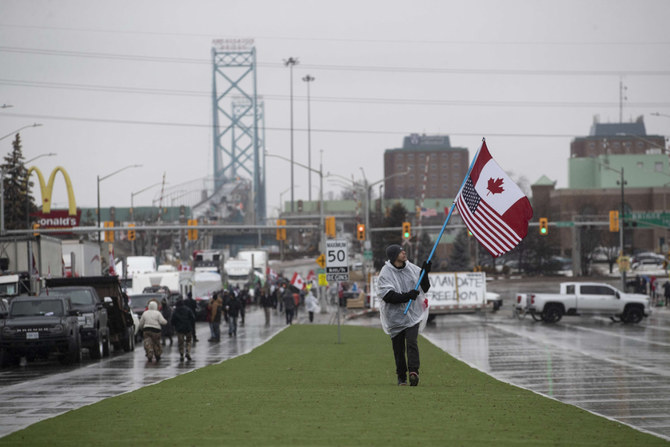
- Ontario Premier Doug Ford declared a state of emergency and threatened heavy penalties against those who interfere with the free flow of goods and people.
- The truckers, egged on by US Republicans, are protesting against Canada’s COVID-19 restrictions
After Pakistan alert, WHO likely to issue wider warning on contaminated J&J cough syrup

- The UN health body said it puts out global medical product alerts to ‘encourage diligence’ by authorities
- The WHO this week sent out alert on five batches of contaminated cough syrup ingredients found in Pakistan
LONDON: The World Health Organization is likely to issue a wider warning about contaminated Johnson and Johnson-made children’s cough syrup found in Nigeria last week, it said in an email.
Nigeria’s regulator recalled a batch of Benylin paediatric syrup last Wednesday, having found a high level of diethylene glycol in the product during routine testing.
The contaminant, alongside another closely related toxin, ethylene glycol, has been linked to the deaths of more than 300 children in Cameroon, Gambia, Indonesia and Uzbekistan since 2022, though there is no evidence that these incidents are linked with the latest recalls.
The UN health body said it puts out global medical product alerts to “encourage diligence” by national authorities and was likely to do so in this instance, “subject to confirmation of certain details from parties.”
The recalled batch of Benylin syrup was made by J&J in South Africa in May 2021, although Kenvue now owns the brand after a spin-off from J&J last year.
J&J has referred requests for comment to Kenvue. In an emailed statement on Friday, Kenvue said it had carried out tests on the batch recalled by Nigeria and had not detected either diethylene or ethylene glycol.
“We continue to work closely with health authorities and the WHO and are engaging with NAFDAC to understand their test results, including verifying the authenticity of the sampled product, the testing methodology used, and results reported by the agency,” the statement added.
Since Nigeria’s recall, five other African countries have also pulled the product from shelves — Kenya, Rwanda, Tanzania, Zimbabwe and South Africa, where the drug was made.
South Africa’s regulator has also recalled another batch of the syrup, which is used to treat coughs, hay fever and other allergic reactions in children.
Diethylene glycol is toxic to humans when consumed and can result in acute kidney failure, although there have been no reports of harm in the latest incident.
RAW MATERIALS
In the 2022 cases, the contamination in the syrups came from the raw materials used by manufacturers in India and Indonesia.
The WHO said it was collaborating with both the manufacturer and regulatory authority in South Africa to investigate the Benylin paediatric syrup, and had information on the source of the ingredients used. Kenvue has previously said it tested its ingredients before manufacture.
The agency said the possibility that the syrup was counterfeit was also “under consideration as part of investigations.”
Earlier this week the WHO sent out a separate alert on five batches of contaminated cough syrup ingredients found in Pakistan that appeared to have been falsely labelled as Dow Chemical products.
It was the first alert the WHO has sent on excipients — elements of a medicine other than the active pharmaceutical ingredient — rather than finished products, the agency confirmed on Friday.
The batches of propylene glycol were contaminated with ethylene glycol.
“It was critical for WHO to also alert manufacturers that may have been procuring this material to exercise more caution,” a WHO spokesperson said by email.
Propylene glycol is not an ingredient in Benylin paediatric syrup, a Kenvue spokesperson said on Friday.
Polish flag carrier LOT cancels Friday flights to Tel Aviv and Beirut, PAP reports

- Decisions about future flights would be made on an ongoing basis
WARSAW: Polish national airline LOT canceled flights on Friday to Tel Aviv and Beirut due to the unstable situation in the region, a spokesperson was quoted as saying by state news agency PAP.
“Today’s flight 151/152 to Israel from Warsaw and to Beirut 143/144 have been canceled,” Krzysztof Moczulski told PAP. He said decisions about future flights would be made on an ongoing basis.
French police arrest man who threatened to blow himself up at Iran’s Paris consulate

- Police verifying man’s identity and trying to determine whether he had weapons
PARIS: A man who had threatened to blow himself up at Iran’s consulate in Paris was arrested by police, a police source said.
French police earlier cordoned off the Iranian consulate, Reuters reporters saw, and did not immediately confirm finding any weapons.
A police source told Reuters the man was seen at about 11 am (0900 GMT) entering the consulate, carrying what appeared to be a grenade and explosive vest.
A Paris police official told The Associated Press that officers were verifying the man’s identity and trying to determine whether he had weapons.
Police earlier said they were at the scene and asked the public to avoid the area but provided no further details.
Service was interrupted on a nearby metro line for security reasons, the RATP metro company said.
A police cordon remained in place on Friday afternoon, but traffic was resuming in the area.
A person at the Iranian embassy who responded to a call from Reuters declined to provide any information on the situation.
It was unclear whether the incident had any link to the escalating tensions between Iran and Israel.
Earlier on Friday, explosions echoed over the Iranian city of Isfahan in what sources described as an Israeli attack, but Tehran played down the incident and indicated it had no plans for retaliation — a response that appeared gauged toward averting region-wide war.
The incident also comes as Paris is gearing up to host the summer Olympics.
* With Reuters and AP
Blinken says US ‘not involved in any offensive operation’

- ‘All I can say is for our part and for all the members of the G7 our focus is on de-escalation’
CAPRI, Italy: US Secretary of State Antony Blinken on Friday refused to comment on reports of an attack by Israel on Iran, beyond saying Washington was “not involved in any offensive operation.”
Speaking to journalists after a meeting with G7 counterparts in Italy, he declined to answer repeated questions about explosions in Iran, and reports that Israel had carried out retaliatory strikes.
“I’m not going to speak to these reported events... All I can say is for our part and for all the members of the G7 our focus is on de-escalation,” Blinken told a press conference on the island of Capri.
“The US has not been involved in any offensive operation,” he said.
Speaking to reporters earlier, G7 host Antonio Tajani, the foreign minister of Italy, said Washington had been informed in advance of the strikes, without giving details.
“The United States were informed at the last moment,” he said, adding that “it was just information” passed on — without saying who by.
The reports dominated the G7 Friday, with Tajani forced to change the agenda, but little public information emerged.
In its final statement, the Group of Seven ministers said: “In light of reports of strikes on April 19th, we urge all parties to work to prevent further escalation. The G7 will continue to work to this end.”
Israel had warned it would hit back after Iran fired hundreds of missiles and drones at Israel almost a week ago, in retaliation for a deadly strike — which Tehran blamed on its foe — that levelled Iran’s consular annex at its embassy in Syria.
Indians head to the polls in world’s biggest election
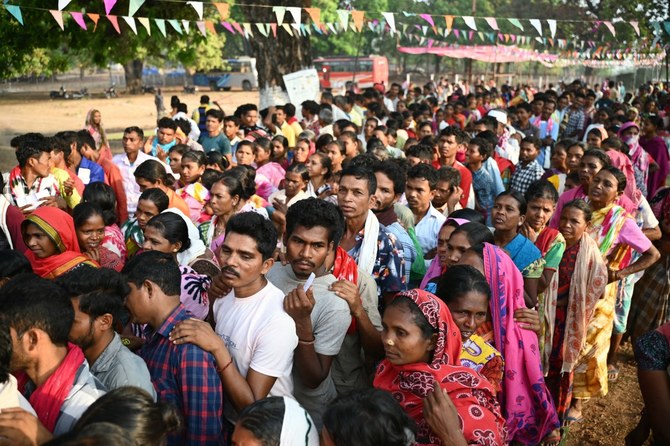
- Polling takes place in phases over the next six weeks, with results expected on June 4
- Over 968 million people are registered to vote, with 168.6 million casting ballots on Friday
NEW DELHI: Indian voters headed to the polls on Friday for the first phase of the world’s biggest general election, in which Prime Minister Narendra Modi is aiming for a rare third consecutive term.
More than 968 million people are registered to vote, with polling taking place over the next six weeks, as results are expected on June 4.
After April 19, the other voting dates will be April 26, May 7, May 13, May 20, May 25 and June 1, with some states completing the process on a single day, and others having it spread out in several phases.
Friday’s polling was held in 21 states and union territories, including the most populous ones such as Uttar Pradesh, Bihar, Rajasthan, Tamil Nadu, and Maharashtra, as well as smaller northeastern states and the northern Himalayan territory of Jammu and Kashmir.
In Kashmir, this is the first election since its special autonomous status and statehood were scrapped through the Indian government’s controversial constitutional amendment in 2019.
Chief Election Commissioner of India Rajiv Kumar told reporters on Friday that 168.6 million people were expected to cast their ballots on Friday.
“The preparations started, actually, two years back. Wide range of preparations … It’s a tremendous exercise,” he said.
MAIN CONTENDERS
More than 2,600 political parties are registered in the marathon election and 543 contested seats in the lower house of Parliament. The party or coalition that wins at least 272 is going to form the government.
Modi is targeting 400 seats for the National Democratic Alliance led by his Hindu nationalist Bharatiya Janata Party, which has been in power since 2014.
He is challenged by an alliance of two dozen opposition parties — the Indian National Developmental Inclusive Alliance, or INDIA, led by the Congress Party, which has ruled the country for close to 45 years since its independence in 1947.
The key leader of the opposition coalition is Rahul Gandhi — the son of Rajiv Gandhi, a grandson of Indira Gandhi, and a great-grandson of Jawaharlal Nehru, all of whom served as prime ministers of India.
While the opposition is trying to appeal to Indian youth with promises to tackle unemployment, free education and medical facilities, the BJP has deployed the same tactics as in previous polls — by mobilizing voters through majoritarian Hindu sentiment, despite constitutional provisions that make it a secular state.
Opinion polls show Modi as frontrunner, with 48 percent of respondents in the most recent survey released by the Centre for the Study of Developing Societies last week naming him as their choice for the prime minister. Gandhi was second, preferred by 27 percent.
“Modi has created an image of a powerful leader, a leader who is not only popular in India but outside too. He has also created an image of not pandering to Muslim communities in India … This image of a leader who does not appease the Muslim sentiments appeals to the Hindu masses. Politics of polarization helps Modi to build an image and aura among a large section of the Hindu voters,” Prof. Venkat Narayan, political analyst and commentator, told Arab News.
“Then the use of social media and the mainstream media is also there to create an image and broaden Modi’s appeal. The media plays a great role in creating this image, they are soft towards Modi and do not ask critical questions.”
If Modi wins the election, he will become the second prime minister, after Nehru, to succeed in three consecutive polls.
“Modi is leading in the polls as he has created an image of doing a lot for different sections of the society. Besides, he projects himself as squeaky clean. People also think that as he has no children, he has no reason to be corrupt or be on the take,” Sanjay Kapoor, analyst and editor of the English-language political magazine Hardnews, told Arab News.
“There are other reasons for his popularity, which include adroit use of media and social media that control all criticism against him. Then there are issues of raising India’s global profile and pursuing an independent foreign policy.”
FUTURE FOREIGN POLICY
Whoever wins the election, the foreign policy direction is likely to remain broadly unchanged, except for India’s orientation toward Israel and Palestine.
Support for Palestine and Palestinian statehood was once an integral part of India’s foreign policy, but in recent years, under Modi’s rule, New Delhi has become closer to Tel Aviv, despite civil society protests breaking out across the country against Israel’s deadly war on Gaza.
“If the INDIA alliance comes to power, then we may see a change in our policy towards Israel and Palestine. The INDIA alliance is sympathetic to Palestinians,” Kapoor said.
“We expect that the INDIA alliance will also restore ties with neighbors like Pakistan, (and) revive SAARC (South Asian Association for Regional Cooperation).”
The member states of SAARC — a regional intergovernmental organization and geopolitical union of states in South Asia — are Afghanistan, Bangladesh, Bhutan, India, Maldives, Nepal, Pakistan, and Sri Lanka.
The last biennial SAARC summit was hosted by Nepal in 2014. Pakistan was to host the summit in 2016, but it was stalled after India refused to participate, following an attack on an Indian army camp in Kashmir that New Delhi blamed on Pakistan-based militants.
VOTERS’ CONCERNS
According to the Centre for the Study of Developing Societies survey, unemployment emerged as the top concern for 27 percent of respondents.
Some 62 percent also said it has been more difficult to find a job in the last five years — during Modi’s second term in office.
“The biggest concern remains inflation and unemployment. The possibility of getting a job decreases if you study more. People are forced to leave India in search of jobs. Some have even gone as far as Russia and Israel,” Kapoor said. “The situation is really dismal.”
Rising prices and inflation were also a major issue — the top concern for 23 percent of the people surveyed by the CSDS.
“Women and the middle class are concerned about the rising prices. Modi is trying to divert attention from these main issues by talking about religion and temples,” said Shashi Shekhar Singh, associate professor at Satyawati College at the University of Delhi.
The CSDS pre-poll also revealed that despite the ruling party’s narrative promoting Hindu nationalist dominance to establish a majoritarian state in India, only 11 percent of respondents saw India as solely for Hindus.
But there were fears the reality on the ground could change if the BJP tried to amend India’s liberal and democratic constitution.
“Indian secularism and the very idea of a plural democracy is at stake,” Singh said.
“There is a fear that if the BJP comes to power with the thumping majority, the liberal and secular democracy will breathe its last. The BJP might lead the nation further down the path of a Hindu majoritarian state.”




